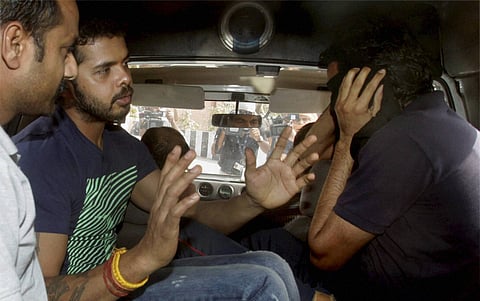ICC lack real powers to control corruption, India’s supercop says
Neeraj Kumar, who handled Cronje-gate and 2013 IPL arrests, opens up to Gulf News

Dubai: Neeraj Kumar, the supercop who played a key role in cracking the Hansie Cronje match-fixing scandal in 2000 and the last major IPL scandal in 2013, feels that the emergence of the Twenty20 format has been a “gamechanger” in raising the level of corruption in cricket over the last 10 years.
For every case [of corruption in cricket] you catch, there could be another 50 cases, which are going scot-free”
Speaking to Gulf News exclusively from New Delhi, the decorated former commissioner of Delhi Police and arguably one of the best brains in tackling the menace, which has raised its ugly head time and again, did not see much reason for the International Cricket Council (ICC) to gloat after their decent disclosure of 32 cases being reported in the last 12 months. “See, the level of corruption cannot be measured in cricket. For every case you catch, there could be another 50 cases which are going scot-free,” said Kumar, who stepped down from his role as the adviser of Indian board’s Anti-Corruption Unit recently after a tenure of three years.
“The ICC, for all their proper intentions, do not have the judicial power to hand over any suspect to their police. If any of the suspects choose not to cooperate during the probe with their anti-corruption officers, they are not in a position to do much,” said Kumar, who felt there will be no improvement in the situation in India unless the proposed bill, which criminalises the act of trying to ‘influence’ results in any sport, is passed as a law. “It’s been more than seven years that an expert panel had drafted a bill. This has still not been passed as a law, which shows it’s not in the government’s list of priorities now,” the official said.
How has the menace of match-fixing and spot-fixing, according to him, evolved over the last two decades since Cronjegate — when the Delhi Police had bumped into the dealings while tapping phone conversations from a hotel room in an unrelated extortion case? “The biggest gamechanger in corruption during this phase had been the evolution of T20 leagues. There have been mini leagues in countries like Nepal, Sri Lanka and of course India where manipulating the results was a common practice. I had given a presentation on such growing trends at the ICC while I was still in my BCCI role,” he said.
While not naming names, Kumar said the shortest format of the game has induced promoters with enough financial resources to invest into T20 teams with expectation of easy returns. “The management of some of these franchises would often influence a core group of players to perform in a certain way to gain in the speculative market,” he explained.
Tip of the iceberg
It was during IPL VI when Kumar was thrust into the limelight again when three Rajasthan Royals players, including former India international Shanthakumaran Sreesanth, was arrested in their hotel room on charges of ‘spot-fixing.’
This proved to be the tip of the iceberg as subsequent police investigations revealed co-owners of the Chennai Super Kings and the Royals indulged in betting and gambling — snowballing it into the biggest ever controversy in the history of IPL — which saw the two teams being banned for two seasons and the birth of Lodha Commission to clean up the game.
Kumar, who retired in 2013 soon after the IPL scandal, joined the BCCI in 2015 and oversaw three editions of IPL since then — which is admittedly the BCCI’s biggest cash cow at the moment. Looking back at his contribution during this phase, Kumar said: “We did whatever we could during the tenure like disrupting a dubiously run league in Jaipur, busting two sets of corruptors and a gang of cricketers. A lot more, however, remains to be done,” he added.


